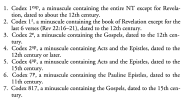There seem to be a great deal of confusion concerning the terms used here.
It is majority text is a statistical construct that does not correspond exactly to any known manuscript. It is arrived at by comparing all known manuscripts with one another and deriving from them the readings that are more numerous than any others.
The majority Text is not the same as the textus receptus.
They are are not identical. The two differ from each other ca. 1900 places.
Here is a partial list of some of the places they differ. This list is far from complete.
King James Onlyists often defend their position by claiming that the KJV is based on the vast majority of manuscripts, but this is not really the case.

carm.org
The term textus receptus and means received text. The term t
extus receptus was first used in 1633 edition produced by Bonaventura Elzevir and Abraham Elzevir who were partners in a printing business at Leiden (note that the KJV was published in 1611). The term caught on and now any edition is referred to as the textus receptus.
However, no two edtions of the textus receptus is exaclly alike.
There have been many edtions of the textus receptus, and they all have differences between them.
Erasmus 5 edtions: (1516 1st, 1519 2nd, 1522 3rd, 1527 4th, 1535 5th)
Robert Estienne = Stephens 4 edtions: (1546 1st, 1549 2nd, 1550 3rd, 1551 4th)
Theodore Beza 3 editions (1565 1st, 1582 2nd, 3rd 1588, 1598 4th)
Isaac Elzevir (1624 1st ed, 1633 2nd ed) see Bonaventura Elzevir and Abraham Elzevir above
Also note the above list is by no means exhaustive.
The KJV did not used Greek manuscripts. They used printed edtions of the Greek text. Primarily they used Erasmus editions 1, 2, 3, 4, 5, Robert Estienne 1550, and Beza 1598. However, these are not the only edtions they consulted.
Erasmus used only 7 manuscripts for his edtion. They are:
View attachment 9453
And lastly when discussing the Hebrew old testament scholars also used the abbreviation MT. This does not mean majority text. In the case of the Hebrew text it mean Masoretic Text.




